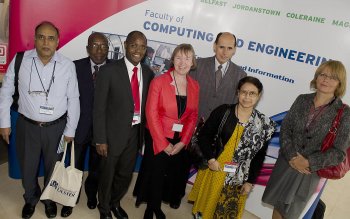
Hundreds of academics and practitioners from 48 different countries are in Belfast this week for the 2011 International Conference on Engineering Education (ICEE), hosted this year by the University of Ulster – the first University, north or south of the border to host this prestigious event.
SDLP leader Margaret Ritchie, who gave the opening address at the conference in Belfast’s Waterfront Hall (Monday August 22 8.30 am), said the outcomes and information from the conference would not only inform and dictate the future of Engineering Education for years to come, but will also make a major contribution to informing and shaping government engineering and investment policies.
“This is something which will enrich the lives of the people of Northern Ireland and ensure that we are better placed to avail of all engineering investment and job opportunities,” she said.
ICEE–2011, which is hosted jointly by Ulster and the International Network on Engineering Education and Research, is an annual forum for academics and practitioners to meet, exchange ideas and explore ways to improve engineering practice to help tackle problems in the developing world.
Conference chair, Dr James Uhomoibhi of the Faculty of Computing and Engineering at Ulster’s Jordanstown campus, said he hopes the event will showcase both the University’s pioneering research and the pivotal role engineering education plays in global development.
“This is an excellent opportunity to showcase engineering research being carried out by Faculty staff at the Jordanstown, Coleraine and Magee campuses. Delegates will have an opportunity to see some of this research themselves when they visit the Jordanstown campus durin the week.
He continues: “The conference theme, ‘Engineering Sustainability for a Global Economy’, will be considered under three key strands: Sustainability, Globalisation and Education. Recent disasters around the world - both natural and man made - such as tsunamis, earthquakes, droughts and conflicts, have highlighted both the importance and relevance of the many engineering products and services being researched at Ulster.”
According to Dr Uhomoibhi, the conference will facilitate the sharing of expertise and knowledge between international partners.
“The conference will open the door to innovative ways of considering relevant issues affecting several people in diverse fields and across different subjects. Participants from around the world will explore and present works in such areas as technology for improved education practice, E-Learning, student engagement, curriculum provision, assessment, lifelong learning and university-industry collaboration etc. as well as the diverse aspects of engineering education related to sustainability and globalization.”
The six-day conference programme includes parallel sessions for papers, workshops, seminars, special focus sessions and poster presentations and is designed to encourage greater international co-operation and stronger academic-industry collaboration aimed at engineering sustainability for a global economy. Keynote speakers include some of the world’s most distinguished and respected engineers, all of whom have a proven track record in business.
Professor John Anderson, Founder, Director and Chief Technology Officer of HeartSine® Technologies Inc., was responsible for the development of the world’s first portable defibrillator, a life saving medical device which is now manufactured and sold worldwide. He was also the first director of the Northern Ireland Bio-Engineering Centre (NIBEC) and former Head of School of Electrical and Mechanical Engineering.
Professor Helen Atkinson is President of Engineering Professors Council, Head of Mechanics of Materials Group, Department of Engineering, University of Leicester and prior to embarking on an academic career, she worked on strategic business planning for the UK Atomic Energy Authority. Using examples from industry, she will discuss how engineers can create wealth, while at the same time protect the environment and reduce global warming.
Professor Renata S Engel is President of the American Society for Engineering Education and Associate Dean for Academic Programs, PENN State University. Her presentation will consider how the engineering curricula has evolved to meet global needs to ensure engineering graduates are equipped with the necessary skills to contribute to global society.
Professor Paul Jowitt is Professor of Civil Engineering Systems and Executive Director of the Scottish Institute of Sustainable Technology at Heriot Watt University. His keynote paper will address some of the issues associated with infrastructural investment in the developing world such as technical knowledge, procurement, project management and local community engagement.
Professor Luiz Carlos Scavarda Do Carmo, Dean, Centre for Science & Technology - PUC-Rio, Rio de Janeiro, who has been actively involved in the process of Engineering Education reform in Brazil, will consider how engineering education is a strategic asset and key to economic growth.
Nigerian academic Professor Val Ekechukwu, Director of Research and Innovation at the National Universities Commission in Nigeria and Professor of Applied Solar Energy in the Department of Mechanical Engineering, University of Nigeria will give a keynote address on engineering education in emerging economies, with a specific focus on Nigeria.
Caption International delgates at the opening day of the 2001 ICEE conference in the Waterfront Hall. From left, Chinmay K Maiti, Emanuel Glakpe, James Uhomoibhi, Helen Atkinson, Jurek Moscinska, Bhasati Maiti, and Kataryna Moskinska.

















